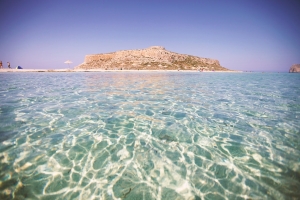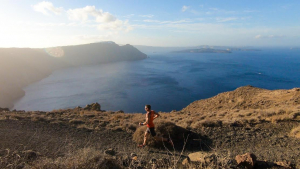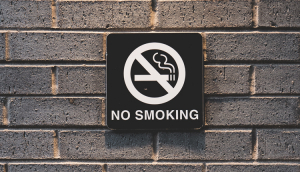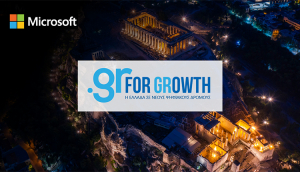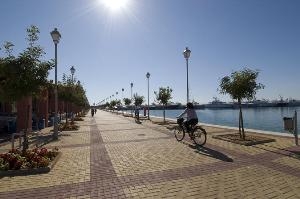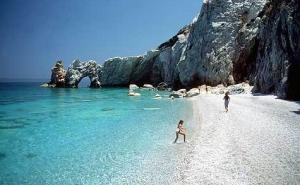BUSINESS CENTRE
XpatAthens
Wanderlust Greece - The Love-List Of Crete
Article source: Greek Reporter
International Distinction For Santorini Experience
Stefanos Tsitsipas Advances To The 3rd Round Of The French Open
Talented Greek tennis star, Stefanos Tsitsipas is on his way to the 3rd round at Roland Garros for the first time. Tsitsipas won against Bolivian Hugo Dellien, in a 4-6, 6-0, 6-3, 7-5 match that lasted over two hours and 49 minutes.
Tsitsipas admitted, "I started thinking what went wrong in the first set. That [bathroom] break helped me. So I went inside mentally prepared to fight more, and I was aware of the situation I was at. Once I got myself into the right mindset, things seemed to flow my way. And from there, winning the [second] set 6-0 was good confidence boost for me. Obviously, after that, he didn't want to give up. He fought as much as he could. But I seemed to prevail at the end."
In the next round, the Greek tennis player is scheduled to face Filip Krajinovic of Serbia and everyone in Greece will be cheering him on!
To read more, please visit: ATP Tour
Photo Credit: @StefTsitsipas
Moving Toward A Smoke-Free Greece
During the presentation, the prime minister stated: "The smoking ban is a bold initiative to protect public health. A symbolic move to modernise and refine our daily lives. But it is also an exercise in mutual respect that ultimately strengthens social cohesion."
The Greek administration sympathizes with the 84% of citizens who consider the failure to implement anti-smoking laws a "cultural degradation" and the 76% who declare themselves outraged.
"We are responding to this displeasure with a national strategy and a strict ban on smoking in public spaces, in private work areas, in spaces where there are children, in cars where children are passengers...but also with a good and extremely inventive information and awareness campaign. Our aim is not to divide but an alliance for health. To highlight the individual responsibility that will lead to collective harmony." he said.
Health Unites us: Alliance For A Better Life Without Smoking
The anti-smoking campaign, whose central message is "Health unites us: Alliance for a better life without smoking" marks the start of a nationwide effort, which is also back by strict fines.
The campaign focuses on 4 lines of action
- Creating a non-smoking culture that emphasizes on prevention.
- Respect for non-smokers.
- Care for smokers by increasing medical support for stopping smoking.
- Evaluating new tobacco products and regulating their circulation on the market.
To read more about the anti-smoking campaign, please visit: AMNA
Microsoft To Build Data Centers In Greece As Part Of "GR For GRowth" Initiative
The initiative was announcer by Microsoft President Brad Smith at the Acropolis Museum in the presence of the Greek Prime Minister, Kyriakos Mitsotakis, and the General Manager of Microsoft Greece, Cyprus, and Malta, Theodosis Michalopoulos.
"Today's commitment to the people and businesses of Greece will position the country among the digital leaders of Europe. A Microsoft data center region provides a competitive advantage to our digital economy. At the same time, it is a long-term investment and a vote of confidence in our country's potential. The cloud is transforming every industry and sector. The investment in skilling 100,000 citizens will empower Today and tomorrow's Greek workforce," said Prime Minister of Greece, Kyriakos Mitsotakis.
Great Autumn Weekend Escapes From Athens
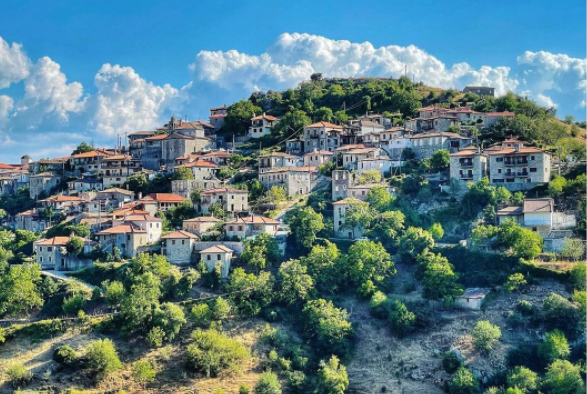
@vaiad•
It may be known for its role during the Greek War of Independence from the Ottoman Empire, but its beauty with special architecture and the gorge of Lucius is what brings visitors to its doorstep today. You can wander the streets of the village and visit one of the monasteries of Lucius. Traditional taverns and cafes are not missing either, as well as shops with pure local products. The historic library and the ecclesiastical museum are interesting and you can always take a walk through the Open Air Museum of Hydrokinesis.
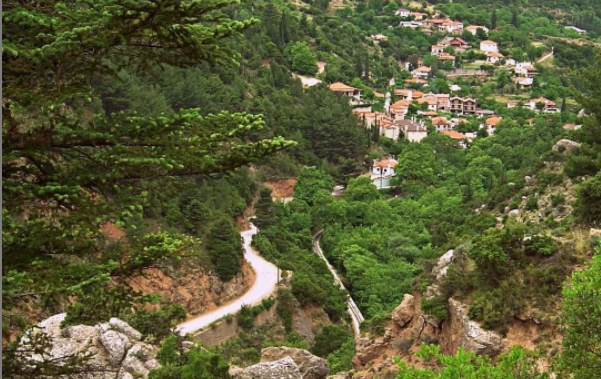
@zoepelos
If you are looking for a truly magical place for your getaways, look no further. Take the car and head to Zachlorou, a village built in the gorge of Vouraikos. The village was built during the Turkish occupation when Epirotes were forced to flee to the Peloponnese. There is a lot of wild beauty – streams, trees, and rocks create a cinematic landscape. The unique Cave of the Lakes is definitely worth a visit!
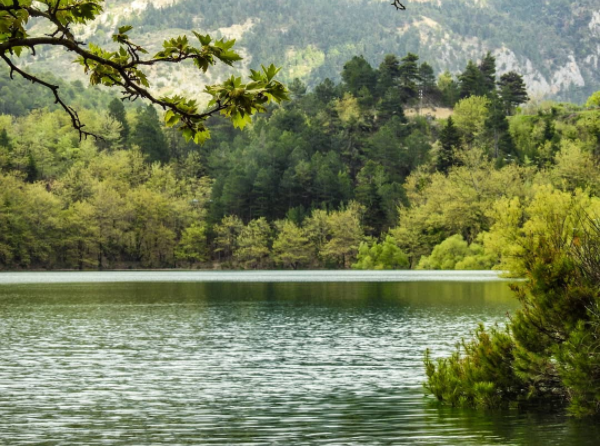
@kostasxwl
In Orini Akrata is Zarouchla, a village that retains its old, traditional character despite the growing number of visitors. Green is all around and gracious stone covers streets, shops, and houses. This is the main feature in the hotels you will stay at for the weekend, but also in the cafes and taverns where you will try delicious, local dishes. If you love nature, Zarouchla is an ideal weekend destination for you, since there you can take walks among the fir trees and the streams. Leaving, take a walk along the beautiful lake Tsivlou, which although owes its existence to a deadly landslide that occurred in 1913, is of incomparable beauty.
Dreams Of Development
Maybe I’m still ‘high’ on spring – maybe the sunshine is doing a number on me. Or maybe there’s more to this feeling that Greece is changing, slowly creeping back from the abyss, towards a better place… I have been riding my bike down to the waterfront 3-4 times a week – down Syggrou, past Faliro, across the Paraliaki and on towards Glyfada…
It’s a good 30km trek (and yes I am helmeted, protected and very careful!). Along the way I often think about how nice it would be to have even a few bicycle-friendly streets, a few more green spaces, maybe something architecturally interesting to look at along the way, basically anything that looks like development, change, renewal.
At the same time, I have equally frequent parallel thoughts about all the things that are happening around – painted buildings, new cafes/restaurants, cleaned up streets, start-ups, entrepreneur help-groups, etc. It’s not a 180-degree change, and it doesn’t mean the problems are solved, but it’s certainly ‘something’…
In truth, there are some significant large-scale projects underway and announced, that promise to re-vamp and re-invent the face and reputation of Athens.
The Stavros Niarchos Cultural Center, already well underway, will include a new home for the National Opera and the National Library of Greece – amid lots of green space, all the way down to the waterfront… Take a look here: http://tinyurl.com/q248ju9
The Rethink Athens project is by now quite well known. I’m not sure what the progress is on this one, but it’s got a lot of eyes on it! http://www.rethinkathens.org/eng/project
And in case you haven’t heard yet, the old airport land at Hellinikon has been slated for redevelopment – unarguably a massive investment by Lamda Development, and one that surely has ‘world class’ stamped all over it. Check out the promo video: https://www.youtube.com/watch?v=3BmNlh2g_W8
I love what Willem Sodderland has to say in his blog – definitely some food for thought: http://tinyurl.com/nx58nep
But is all this ‘development’ or ‘dreams’? Why can’t it be both? My glass may not be half full, but it’s getting there…
Until next week,
Jack
In this weekly space, keep up with ‘Jack’ as he navigates daily life in Athens… Anecdotes, stories, hits & misses, the good, the bad and, well, the rest…
In Search of Glorious Beaches – Skiathos
Meyáli Ámmos, on the road to Koukounaries and Ahladiés, is a popular beach with crystal clear waters and picture-perfect tavernas by the sea.
Banana (or Krassa bay) is a wonderful beach surrounded by pine trees that attracts young people thanks to its water sports facilities and the frenetic parties that take place in its cafes and bars all day and all night! Banana’s sister beach, Small Banana, next to it, is ideal if you want to avoid the crowds or if you are looking for some peace and seclusion. It is famous for its clear blue waters and its pine trees. Those who want to get away from the crowds should also check out the western part of the island: Mandráki, Eliá, Agkistros and Small and Big Asélinos are all ideal choices to escape the crowds. Lalária, on the northeastern part of the island, is the kind of beach you find once in a lifetime. Impressive white rock formations; small round pebbles (which is what lalaria means in Greek), beautifully clean waters and the “hollow rock” standing imposingly on the beach provide a beautiful natural backdrop that will take your breath away. Note: you can only reach the beach by boat departing, weather permitting, from the port of Skiáthos.
Following walking routes
Nature lovers will be thrilled by the 25 197-km long, well signposted walking routes and trails which pass through some of the most beautiful and unspoilt parts of the island. Depending on your stamina, you can go on walks which last from one to six hours. Follow the routes and discover the pristine interior of the island or fabulous secluded spots with amazing views of the Aegean! A suggested route to explore the beauties of the island starts from Asélinos and goes past Kounistra Monastery, Small Asélinos Beach and Alygariés Beach ending at Kehriá Beach. The routes Ayia Eleni to Krifi Ammos and Madraki-Elia-Agkistro for discovering excellent beaches of unique beauty!
Getting there:
• By ferry or high speed ship from the port of Volos or Ayios Konstantinos.
• By ferry from the port of Thessaloniki (only during summertime)
• By air from Athens or Thessaloniki
Source: Visitgreece.gr
Chinese Investors Look for Rare Greek Earth Metals
The Greek subsoil and its rare earth metals have attracted the interest of Chinese investors. On the occasion of the ERES international conference hosted in Greece from September 4 to 7, a delegation from China, which is considered the absolute leader in the earth metals field, visited Greece.
It is estimated that 17 valuable minerals associated to the high-tech industry are present in Greece. The majority lies in the underwater area of the northern Aegean Sea and in Thrace.
Indications of rare minerals appear in the areas of Rhodope, Thessaloniki, Chios, Kilkis, and in the coastal and underwater area of Strymonikos Bay, and bauxites on the Greek mainland.
These earth metals can be used as catalytic automobile converters, in petroleum refining, in TVs, mobile phones, portable DVDs, laptops, rechargeable batteries in hybrid and electric cars, wind turbine generators, medical devices, photovoltaic systems, missile defense satellites and many more.
To read more, please visit greekreporter.com
By Nikoleta Kalmouki
Great Greek Books To Read
The summer season is slowly approaching and plans for some down time are starting to take shape. This is a perfect time to choose some classic Greek books or modern day favorites to keep us company while lying under the sun or relaxing at home. “The Iliad” by Homer: The most basic of Greek classic literature. Homer’s tale written of the Trojan Was around 8th century BC is blood-drenched and riveting. With translation by Robert Fagles you can’t go wrong.
“The Odyssey” by Homer: In this sequel to “The Iliad,” Odysseus takes the long way home to Ithaca after the Trojan War. His ensuing adventures have inspired artists and writers ever since.
“The Alexiad” by Anna Komnene: The Byzantine Empire was renowned for its high level of literacy. So it should surprise no one that the emperor’s daughter wrote this detailed, if not exactly unbiased history of her father’s reign.
“The Greek War of Independence” by Peter H. Paroulakis: This illustrated history is a good and enlightening starting point for anyone interested in learning how the Greeks won their independence from the Ottomans in 1821.
“Collected Poems” by George Seferis: The poet captures the essence of Greece and Greek identity in skillfully-rendered, beautifully-wrought verse. Deceptively simple lines are charged with timeless, powerful emotion.
“Complete Poems” by Constantine P. Cavafy: A complete edition of the Alexandrian Greek poet’s lush, sensual verse appeared in print only after his death.
“Zorba the Greek” by Nikos Kazantzakis: Read the book which inspired the classic film by director Michael Cacoyannis. You’ll be stunned by the violence, lyrical descriptions and the differences between the film and the original text.
“To Lathos” by Antonis Samarakis: This politically-charged novel is perhaps Samarakis’ best-known book about a wrongfully-accused man in a police state. Published in 1965, it was translated into English in 1969 as “The Flaw.”
“Little Infamies” by Panos Karnezis: The author paints vivid, darkly comic portraits of Greek life in his short story collection. Karnezis, who writes in English, has subsequently written two novels with Greek themes, “The Maze” and “The Birthday Party.”
“Eleni” by Nicholas Gage: The book captures the biography of Gage’s mother, a victim of the brutal Greek Civil War. Many Greek villages were consumed by silence after the war, where survivors of torture often lived side by side with their torturers who were never prosecuted for their crimes. Gage’s story is extraordinary, powerful and true.
By Konstantinos Menzel


